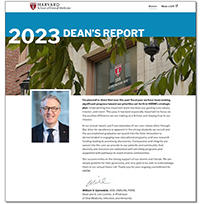
In one of the first clinical trials to explore treatment of an aggressive form of oral precancer with immune checkpoint therapy (ICT), researchers from the Harvard School of Dental Medicine (HSDM), Dana-Farber Cancer Institute, and other collaborators found promising results for treating a high-risk oral precancerous disease with ICT.
Their study, Nivolumab for Patients With High-Risk Oral Leukoplakia published in JAMA Oncology, followed the treatment of 33 patients with high-risk oral proliferative verrucous leukoplakia (PVL), an uncommon but aggressive oral precancerous disease characterized by its tendency to progress to invasive oral squamous cell carcinoma in at least 60% of patients.
PVL first appears as white patches usually on the gums but may occur anywhere in the mouth, spreading over time. The condition is particularly difficult to control because by the time it is finally diagnosed, the patches are very large and have often spread to multiple areas of the mouth. To date, there have been no therapies shown to affect the progression of the disease.
 “This is the first study of its kind that treated this condition which is highly associated with cancer development, using systemic immunotherapy rather than surgery or laser,” said Dr. Sook Bin Woo co-author of the article and associate professor of Oral Medicine, Infection, and Immunity at HSDM and program director of Oral and Maxillofacial Pathology based at Brigham and Women’s Hospital.
“This is the first study of its kind that treated this condition which is highly associated with cancer development, using systemic immunotherapy rather than surgery or laser,” said Dr. Sook Bin Woo co-author of the article and associate professor of Oral Medicine, Infection, and Immunity at HSDM and program director of Oral and Maxillofacial Pathology based at Brigham and Women’s Hospital.
After treating leukoplakia lesions with Nivolumab, a targeted therapy drug that acts as an immune checkpoint inhibitor, findings showed a positive clinical response. Twelve patients (36%) demonstrated the best overall response in the change in their clinical-pathologic composite score, with 3 (9%) demonstrating a greater than 80% reduction in composite score. Two patients had complete resolution of at least one target lesion.
Although few patients had complete lesion regression, this encouraging trial lays the groundwork for greater study by demonstrating potential clinical activity and acceptable safety with the use of ICT in a population with high-risk precancer.
“The data generated from this study regarding the mutations associated with PVL, as well as the types of immune cells within the lesion that affected treatment response, set the stage for further innovation regarding treatment of this and other precancerous lesions in the mouth,” Woo said.
As cohort Principal Investigator for the InAdvance study 22-200, Woo is leading a biobanking effort launched to evaluate state-of-the-art early detection and precision prevention strategies for people at higher risk of developing cancer and to foster collaboration between researchers. She is building a cohort of oral leukoplakia patients, collecting patient-reported data, medical record data, family history, and biospecimen samples. The InAdvance Study is part of the Centers for Early Detection and Interception of Cancer (CEDI) within the Dana Farber Cancer Institute and will be a unique resource to better understand oral precancerous lesions, progression, and treatment.


